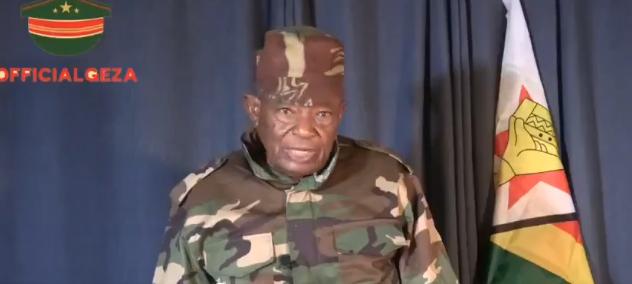News / National
Did Geza win or lose the battle?
01 Apr 2025 at 08:07hrs |
0 Views

War veterans' leader Blessed Geza's call for an uprising against President Emmerson Mnangagwa did not materialize as expected, with no street protests or demonstrations taking place. Instead, Zimbabweans chose mass action in the form of a nationwide stayaway, signaling widespread discontent with Mnangagwa's government.
The question now is whether Geza's attempt was a failure.
Judging by his initial objective - sparking an uprising to remove Mnangagwa - he did not succeed. However, he managed to galvanize public frustration and inspire a form of protest that saw many Zimbabweans refusing to heed government pleas to go to work. While Geza's call for mass action did not result in mass demonstrations, it was not entirely in vain.
The reasons behind the stayaway are varied. Many Zimbabweans are disillusioned with Mnangagwa's leadership, frustrated by years of economic turmoil and governance failures under ZANU-PF. However, fear of violent repression by security forces, combined with an unwillingness to be drawn into ZANU-PF's internal power struggles, likely discouraged direct street action.
It is difficult to argue that people stayed away because they rejected Geza's call. Many Zimbabweans are eager to see Mnangagwa go, regardless of the means. The stayaway itself demonstrated the deep-seated anger toward the government.
From a strict perspective, Geza failed to achieve his primary goal - removing Mnangagwa through an uprising. But from a broader view, the stayaway was a significant act of defiance, exposing the government's vulnerabilities and signaling that dissent is growing.
Zimbabweans have a long history of using stayaways as a form of protest, knowing that direct confrontations with security forces often result in brutal crackdowns. Geza's message was not just about a single event but part of a broader critique of Mnangagwa's rule - accusing him of corruption, nepotism, and surrounding himself with “thieves, conmen, and heartless killers.â€
While his call to action did not achieve immediate regime change, it succeeded in drawing local, regional, and international attention to Zimbabwe's deepening crisis. The ultimate impact of this event remains uncertain. Mnangagwa remains in power, but his position appears increasingly fragile.
Yesterday's stayaway was just one battle in a longer political struggle. Whether Geza's efforts will lead to greater upheaval or further pressure on Mnangagwa depends on future government actions, public sentiment, and the level of support Geza receives from key stakeholders, including the military, opposition parties, and civil society.
What is clear is that the political temperature in Zimbabwe is rising - and the pressure on Mnangagwa is not going away anytime soon.
The question now is whether Geza's attempt was a failure.
Judging by his initial objective - sparking an uprising to remove Mnangagwa - he did not succeed. However, he managed to galvanize public frustration and inspire a form of protest that saw many Zimbabweans refusing to heed government pleas to go to work. While Geza's call for mass action did not result in mass demonstrations, it was not entirely in vain.
The reasons behind the stayaway are varied. Many Zimbabweans are disillusioned with Mnangagwa's leadership, frustrated by years of economic turmoil and governance failures under ZANU-PF. However, fear of violent repression by security forces, combined with an unwillingness to be drawn into ZANU-PF's internal power struggles, likely discouraged direct street action.
It is difficult to argue that people stayed away because they rejected Geza's call. Many Zimbabweans are eager to see Mnangagwa go, regardless of the means. The stayaway itself demonstrated the deep-seated anger toward the government.
From a strict perspective, Geza failed to achieve his primary goal - removing Mnangagwa through an uprising. But from a broader view, the stayaway was a significant act of defiance, exposing the government's vulnerabilities and signaling that dissent is growing.
Zimbabweans have a long history of using stayaways as a form of protest, knowing that direct confrontations with security forces often result in brutal crackdowns. Geza's message was not just about a single event but part of a broader critique of Mnangagwa's rule - accusing him of corruption, nepotism, and surrounding himself with “thieves, conmen, and heartless killers.â€
While his call to action did not achieve immediate regime change, it succeeded in drawing local, regional, and international attention to Zimbabwe's deepening crisis. The ultimate impact of this event remains uncertain. Mnangagwa remains in power, but his position appears increasingly fragile.
Yesterday's stayaway was just one battle in a longer political struggle. Whether Geza's efforts will lead to greater upheaval or further pressure on Mnangagwa depends on future government actions, public sentiment, and the level of support Geza receives from key stakeholders, including the military, opposition parties, and civil society.
What is clear is that the political temperature in Zimbabwe is rising - and the pressure on Mnangagwa is not going away anytime soon.
Source - online
Join the discussion
Loading comments…


































